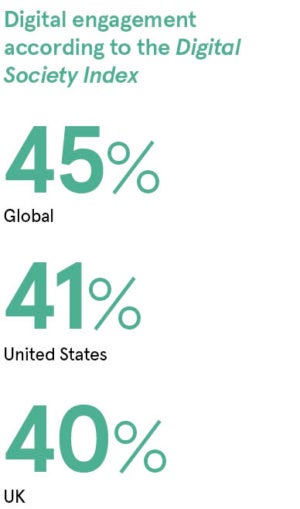
The digitisation of advertising has created a paradox for many chief marketing officers (CMOs). Advertising is more effective and accountable, but expectations of short-term return on investment have risen sky high. There’s a risk that longer-term brand premium is undermined.
In our recent global survey of 1,000 CMOs, securing long-term investment was identified as the number-one barrier to successful marketing strategies. And yet it’s clear that strong brands still deliver long-term shareholder value. Intangibles are growing on balance sheets and investors are all too aware of the value that brand premium can command.
Disruption of media and marketing, driven by the digital economy, makes it dangerous to assume that brand value still works the way it used to. Of the ten largest businesses in the world by market capitalisation, seven are built on heavy investment in technology and platforms that connect people. It’s clear that people premium is now just as influential in unlocking shareholder value through digital as brand premium.
The digital economy is a growth certainty in an uncertain world, but when we look at the bigger picture, people often feel that digital isn’t working for them. Our Digital Society Index suggests that digital engagement in the UK – a measure of how positive people feel about the impact of digital as a force for good – stands at just 40 per cent.
There’s an obvious read across for business: put people premium at the heart of digital transformation and you can build a real and sustainable advantage, but to do this successfully requires focus in four key areas.
First, developing the capability to capture data across every touchpoint with customers and, critically, bringing this together under one platform.

Second, making sense of that behaviour through real-time insights. This not only requires dashboarding and historical data analysis, it’s about predictive analytics that can identify patterns and understand, for example, if there are new segments to target or new influences on people’s decisions.
The third element is around performance measurement. The role of media has been transformed as customer loyalty is tested by instant access to information, and the timeframe between media strategy and activation shrinks. To enable the speed required to create new digital services, content and segments, brands must embrace more entrepreneurial, test-and-learn approaches, adopt more agile methodologies and a sprint mentality.
The final step is to create closer alignment between media and content, underpinned by human intelligence. A seamless learning environment is critical in building both people and brand premium, while making sure the rest is automated.
These imperatives are changing the way agencies like Carat operate. As part of the Dentsu Aegis Network, we share its M1 platform as the backbone for human intelligence and are able to leverage better insights, smarter planning and targeted media activation against real people.
Digital is no longer just another communication channel, it’s everywhere. Every business will be a digital business and every one of us is going to be impacted. Unless companies embrace this reality with a people-first approach, they risk becoming more and more disconnected from consumers with serious implications for their brand premium, sales and shareholder value.
For more information please visit carat.com


